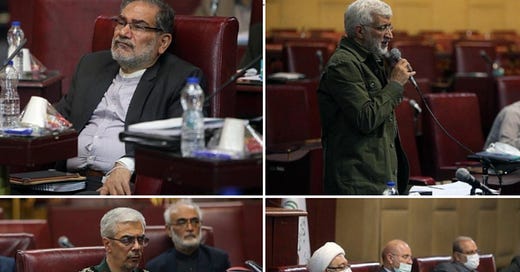US envoy: “We are waiting to see whether Iran can get itself to cross the finish line”
The Iranians “seem at this point not capable of providing an answer,” US Iran envoy Rob Malley told NPR.

The United States assesses that Iranian decision-makers have not yet been able to reach internal consensus on whether or not they want to return to the 2015 Iran nuclear deal, US Iran envoy Robert Malley said in an interview with NPR. His comments come after US and European officials say Iran added new, overreaching demands at indirect US Iran talks held in Doha last week mediated by the European Union (EU) negotiators.
“At this point, our assessment is that they haven’t made that fundamental decision whether they are interested or not,” US Iran envoy Rob Malley told NPR’s Steve Inskeep in an interview aired on July 5. “They are going to have to decide sooner or later because at some point, the deal will be a thing of the past.”
In the Doha talks last week, EU negotiators “put on the table very detailed outlines of what they think a fair outcome would be,” Malley said. “We have said we are prepared to take that deal. The party that has not said yes is Iran.”
“We are waiting to see whether Iran can get itself to cross the finish line,” Malley said.
“So…the party that needs to provide an answer now is Iran,” Malley said. “If they were not prepared to do so, it is not clear why they were prepared to go to Doha.”
Lead Iranian nuclear negotiator and deputy foreign minister Ali Bagheri-Kani, who led the Iranian delegation to the talks in Doha June 28-29, suggested in remarks reported by the Iranian media on July 3 that Iran was in touch with EU Deputy Secretary General and Iran talks coordinator Enrique Mora about a possible follow up meeting. “There are exchanges between us and Enrique Mora on the time and place of the next round of the talks and they are being finalized,” Bagheri said July 3, according to Iranian journalist Abas Aslani.
But a European official told me that no such meeting is in the works.
“They talk this up,” the European diplomat said July 5, referring to the Iranians. “It is not in the cards.”
Iranian officials have been silent so far about an unannounced meeting Bagheri held in Moscow with Russian Deputy Foreign Minister Sergey Ryabkov and Russian ambassador to the IAEA Mikhail Ulyanov on July 1st, which was disclosed by the Russian mission Vienna in a tweet. “The meeting was frank and useful,” Ulyanov said about the meeting, which also included Iran’s ambassador to Russia.
Malley, in his interview with NPR, described the Doha meeting as a “wasted occasion,” and Iran incapable so far of taking yes for an answer.
“The discussion that really needs to take place right now is not so much between us and Iran, although we're prepared to have that,” Malley said. “It's between Iran and itself. …They need to come to a conclusion about whether they are now prepared to come back into compliance with the deal, if we're prepared to do the same, and we've said we are.”
French President Emmanuel Macron, meeting new caretaker Israel Prime Minister Yair Lapid in Paris today, also suggested that Iran is the party unwilling to take the deal on the table, but they would keep trying.
“Iran still refuses to seize the opportunity offered to it to conclude a good agreement,” Macron said while receiving Lapid at the Elysee Palace on July 5. “We will continue, in close coordination with our partners, all the efforts to try to bring Iran to reason.”
European Union foreign policy chief Josep Borrell said he called Iranian Foreign Minister Hossein Amir-Abdollahian July 5 and warned that the window for reviving the Joint Comprehensive Plan of Action is shrinking.
“If we want to conclude an agreement, decisions are needed now,” Borrell tweeted July 5. “This is still possible, but the political space to revive the JCPOA may narrow soon.”
“There still is time to resolve this,” Malley told NPR. “There still is time to get back to the deal which was working. We hope Iran chooses that course. It is the course to which we remain committed.”
Iranian American international affairs analyst Sina Azodi said the Islamic Republic of Iran has had sort of a chronic problem making critical foreign policy decisions, one that does not seem to have been resolved by the consolidation of power by Iranian hardliners after the election of Ebrahim Raisi last year.
Azodi said he believes that while the Iranian system decided that it wants the JCPOA, as we get closer to the US election cycle, some Iranian decision-makers believe it may be more risky for Iran to return to the sanctions relief of the deal only to have the next Republican US administration yank it away again.
“From their perspective, they already passed the shock of sanctions,” Azodi, a non-resident fellow with the Atlantic Council, said. “And the question they ask, [by returning to the deal], are we going to expose ourselves to [the shock of] sanctions again at a time when we are barely standing on our feet.”
A deal becomes less likely as we approach the US midterm elections in November, and in its aftermath, suggested Ali Vaez, director of the Iran program at the International Crisis Group.
After the US midterm elections, “Iran’s interest in dealing with a lame duck administration” is likely to diminish, and the “Iranians are likely to decide to postpone the deal until the next” US presidential election “with their nuclear leverage intact,” Vaez told CNN.
“As such, the options are not between a deal now or six months from now, but rather it is between a deal now or six years from now,” Vaez said.
**


